#worker's union
Text

#us politics#memes#shitpost#economics#economy#workers#working class#worker's rights#worker's union#wage gap#wages#raise the minimum wage#living wage#productivity vs. pay#productivity#40 hour work week#republicans be like#conservatives be like#libertarians be like
2K notes
·
View notes
Text
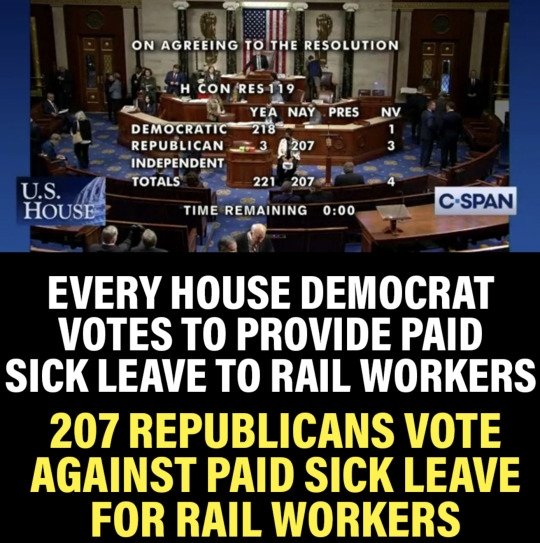
After monthslong fears of a national railroad strike, Congress voted Wednesday to force an end to negotiations between the railroads and their unions with a pair of bills designed to draw concessions from both sides.
One bill (which passed with 79 Republican votes and 211 Democratic ones) codified the higher wages the railroads were offering. Members of Congress also voted to implement mandatory sick time as part of the deal, a nod to worker demands for more paid time off that railroads were unwilling to relent on.
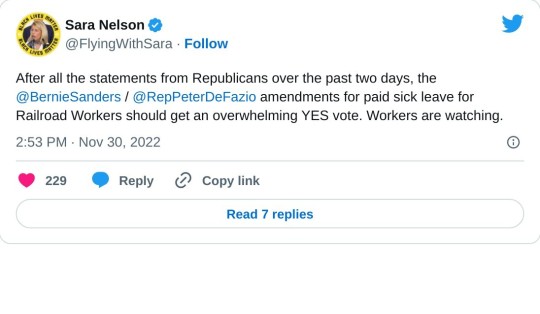
That successful amendment, sponsored by Democratic Representative Peter DeFazio and independent Senator Bernie Sanders, came on the heels of bipartisan criticism of President Joe Biden's support of a deal without concessions for paid time off, a deal-breaker that earned scorn from progressives like Alexandria Ocasio-Cortez alongside conservatives like Missouri Senator Josh Hawley.
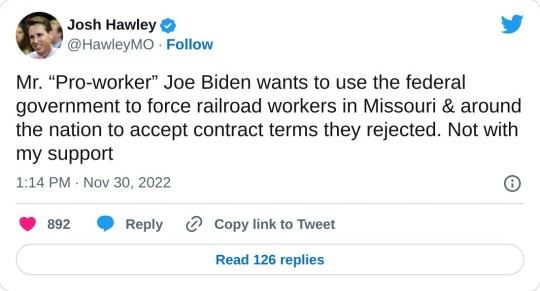
Florida Senator Marco Rubio tweeted Tuesday he "will not vote to impose a deal that doesn't have the support of the rail workers."
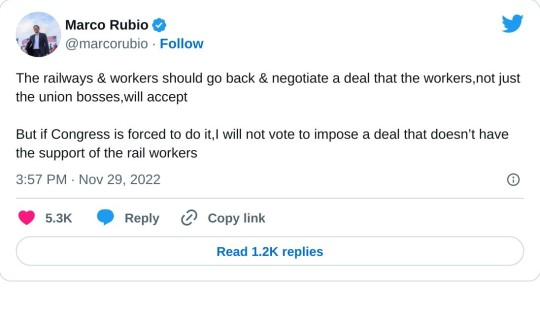
Ultimately, all but three Republican members of Congress—who, notably, have unlimited sick days and all 10 federal holidays off per year—still voted against it.
Internally, the result was largely expected. House Minority Leader Kevin McCarthy indicated to reporters prior to the vote few Republican members were expected to vote in favor of increasing paid time off.

But outwardly, it's not clear why: So far, no Republicans have offered a public rationale for rejecting the deal, nor is it clear whether they opposed the concept of sick time or congressional intervention in railroad workers' efforts to negotiate the deal for themselves.
In early negotiations, the unions requested 15 days of sick leave, while the resolution adopted Wednesday notably had just seven. Numerous Democrats also voted against the larger bill to avert the strike, calling the compromise a betrayal of workers' desire to negotiate a contract on their terms.
However, the fact no Democrats voted against the sick time provision signaled to some that Republicans were voting to prevent workers from obtaining benefits they themselves have: namely, the ability to take time off work whenever they feel the need.
In an earlier vote in the Senate this year, North Carolina Republican Richard Burr and Mississippi Republican Roger Wicker introduced a resolution intended to resolve the strike that did not include provisions for sick leave, earning scorn from Sanders in a speech on the Senate floor. (The resolution failed.)
The disparity between railroaders and members of Congress was visibly on display on social media after the vote.
Notably, a Politifact examination of a Facebook post several years ago alleging similar claims determined there is no limit on sick days or time off for members of Congress, while a Bureau of Labor Statistics report from 2020 found the average private industry worker received an average of eight paid holidays, seven paid sick leave days and 11 paid vacation days per year after one year of work.
And while railroaders get anywhere between three to four weeks of paid vacation and over 10 personal leave days per year, many do not have the flexibility to use them the way people in other industries—like Congress—typically do.
"The 'working class party' strikes again," Justin Baragona, a media reporter for the Daily Beast, tweeted following the vote.
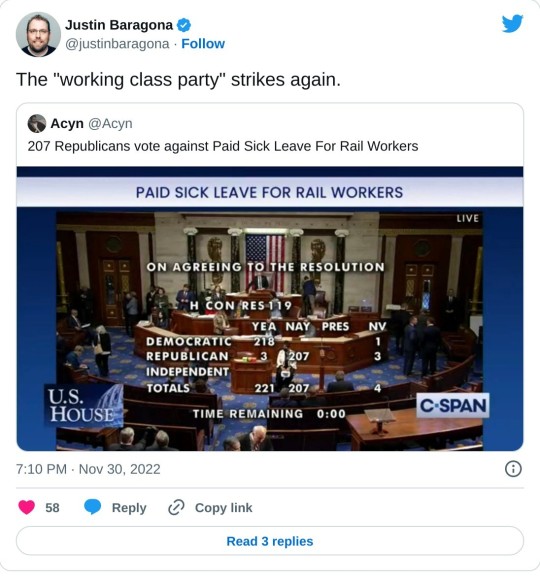
#us politics#2022#twitter#tweet#republicans#conservatives#gop#paid sick leave#railway workers#railroad unions#railroad strike#railroads#working class#worker's rights#worker's union#pro union#union workers#newsweek#rep. Peter DeFazio#sen. bernie sanders#sara nelson#sen. josh hawley#sen. marco rubio#jake sherman#rep. kevin mccarthy#Justin Baragona#sen. richard burr#sen. Roger Wicker
48 notes
·
View notes
Text

Source

Source
54K notes
·
View notes
Text
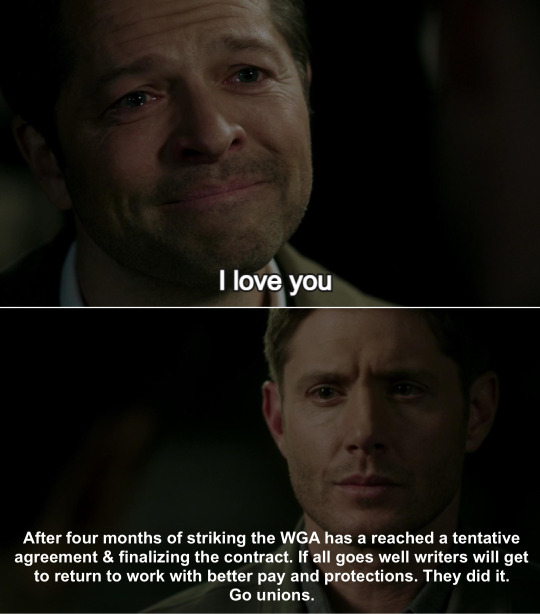
I’m so happy for them
[Image Description: Castiel from Supernatural is saying I love you, underneath is an image of Dean Winchester with the caption: “After four months of striking the WGA has a reached a tentative agreement & finalizing the contract. If all goes well writers will get to return to work with better pay and protections. They did it. Go unions”]
(Source)
#wga solidarity#wga strong#after months of watching union busting and anti union tactics#wga is coming out strong#hopefully sag is next!#writers strike#support unions#wga strike#sag strike#supernatural meme#destiel#destiel meme#workers rights#fuck the amptp#destiel news#mine#we’ve hit the note amount where people start fighting in the notes#stop fighting kids#but also the strike was absolutely necessary#withholding labor is how unions negotiate for better rights#the CEOs are multimillionaires who refused to pay proper wages#they needed to receive heavy losses so they’d actually come to the table listen to union demands
74K notes
·
View notes
Text

vice news
ironically i am working right now so i can’t do a full post on this like i would really prefer to do… but these are the most cartoonishly evil people that you could possibly imagine, even in a society as flawed as the one we’ve built for ourselves. these are bedrock groups devoted to protecting the american worker and consumer. massive huge giant waving red flags 🚩
24K notes
·
View notes
Text
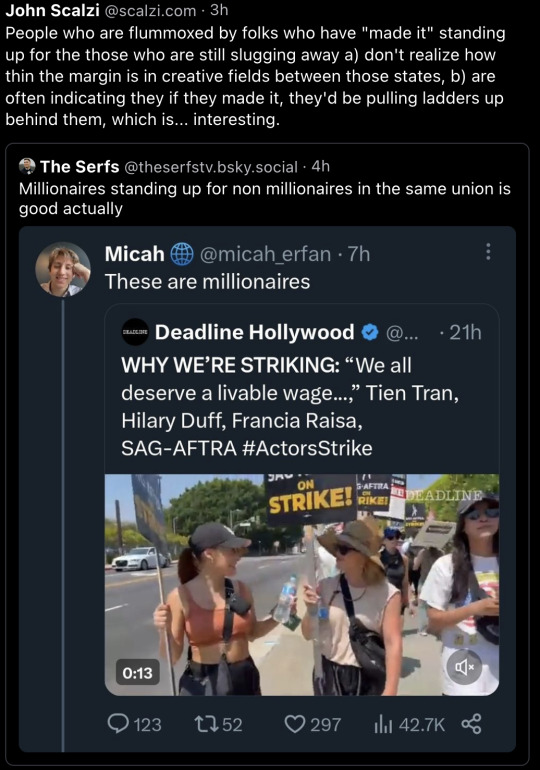
51K notes
·
View notes
Text

July 25, 2023 - Striking stuntman Mike Massa walks in the SAG-AFTRA picket line while on fire. [video]
#sag aftra#strike#actor's strike#writer's strike#industrial action#workers#workers struggle#picket line#gif#2023#stuntman#unions#screen actors guild#usa
48K notes
·
View notes
Text















youtube
41K notes
·
View notes
Video
join a union
the power of collection action
#tiktok#Adam Conover#collective action#union workers#labor unions#unions#protest#labor vs capital#labor rights#capital vs labor#labor movements#labor movement#workers rights#workers vs capital#workers#writers strike
37K notes
·
View notes
Text
same people crying about ups drivers winning $42/hour are the same people who dismiss unions and say they just take your money and don't do anything for you. Bet you'd like $42/hour!!!!!!!
#not to discount the experiences of workers like those part of the national nurses united union#who are working to unseat corrupt and ineffective union staff who have not been representing their members#but a union is made up of its members and if you dont like what your union is doing there are avenues to get involved#also! a union's power comes from its membership numbers. if youre working at a union site and youre not a member. well.#why do you love management so much#and if your workplace isnt unionized. well. there hasnt been a better time in a century to get started#henry speaks
26K notes
·
View notes
Text

#us politics#twitter#tweet#2023#sen. bernie sanders#vermont#union workers#unions#pro union#workers unite#worker's union#working class#working class solidarity
177 notes
·
View notes
Text
As we learned in the recent rail union contract negotiations, ruthless profit-seeking has made conditions for railworkers unbearable. It’s also made railroads less efficient. America badly needs a national rail service owned and operated for the public good.
Earlier this year, the federal board charged with overseeing America’s rail network called a hearing to discuss widespread complaints about higher costs and poor service. Predictably enough, rail executives sought to blame the pandemic and labor shortages for the likes of gridlock and supply-chain breakdowns. But the dysfunction on America’s railroads is neither a product of COVID-19 nor the result of nebulous constructs like the so-called “Great Resignation.” As Matthew Buck explained earlier this year in an article for the American Prospect, the single biggest contributors have been corporate monopolism and financialization — both of which contributed to the horrendous working conditions at the center of the recent showdown in Congress.
Thanks in large part to Jimmy Carter and Ronald Reagan–era deregulation, American rail has steadily become more consolidated — the number of major carriers shrinking from forty to just seven between 1980 and the present day. Unsurprisingly, there’s little evidence that this shift has made rail transport any more efficient. It has, however, made the rail business incredibly lucrative. In an effort to wring as much profit from railways as possible, company barons have in turn cut costs, laid off workers, and introduced a host of other changes ostensibly geared to improving the quality of service. Central to this project has been something called “precision scheduled railroading” (PSR), the brainchild of late executive Hunter Harrison. Under PSR, as Buck explains:
"Railroad management’s job is to drive down the 'operating ratio,' or operating expenses as a percentage of revenue. In other words, Wall Street judges railroads’ success based in part on spending less money running the railroad and more on stock buybacks or dividends. Theoretically, focusing on lowering operating ratios pushes railroads to be more efficient, to do more with less. But when railroads have the market power they have today, they can instead 'do less with less,' as shippers and workers put it."
The upshot, in addition to appalling conditions for an ever-diminishing workforce, is that railways — a basic utility relied upon by millions every day for commerce and transport — are now treated more than ever as an asset designed to be milked for profit than a service structured to meet need.
For shareholders, the whole arrangement has worked out brilliantly. As companies like Union Pacific have laid off tens of thousands of workers, revenues have gone through the roof and billions have been paid out through dividends. Measured against more relevant metrics, of course, it’s been a catastrophe: even before the pandemic, both overall productivity and the number of usable track miles were down. When COVID-19 brought with it backlogs, derailments, and higher costs, however, it became glaringly clear that cutbacks to the railways driven by their hyperfinancialization have rendered them a significant weak point in the country’s supply chain.
One lesson in all this is that an enterprise can be profitable — and thus “efficient” in a narrow business sense — without actually working particularly well or operating effectively to service the needs around which it’s ostensibly erected. This is true in most industries, but it has always been particularly applicable in the case of rail. As the late historian Tony Judt once explained, the very idea of competitive or market-based railroads is, for very straightforward reasons, fundamentally incoherent:
"You cannot run trains competitively. Railways — like agriculture or the mail — are at one and the same time an economic activity and an essential public good. Moreover, you cannot render a rail system more efficient by placing two trains on the same track and waiting to see which performs better: railways are a natural monopoly. . . . Trains, like buses, are above all a social service."
Judt was primarily writing about Britain’s railways, but the essence of his argument applies to America’s as well. Actual “competition” is a non sequitur when it comes to railroads and, fittingly enough, private monopolism has left a handful of rail giants with what are essentially noncompetitive fiefdoms in different corners of the country. Deregulation has additionally allowed the tiny remaining handful of companies to discontinue service on unprofitable routes, leaving whole regions cut off. With greater control and fewer constraints on the terms of their operations, they’ve also been at liberty to raise prices and introduce new fees. Bottlenecks, in fact, often provide further opportunities for such price-gouging — one executive boasting on a 2019 earnings call that Union Pacific is in a position to “take some pretty robust pricing to the market” (i.e., charge more regardless of efficiency or the quality of service).
A further corollary, of course, is that those who actually make the trains run and keep the tracks in working order have been increasingly expected to do more with less and endure a brutal work culture no reasonable person could possibly defend: having gone three years without a raise, many railworkers are now required to be on call more or less around the clock and expected to report for shifts of up to eighty hours on as little as ninety minutes’ notice. Unable to take time off even in the event of an emergency, many also face punitive attendance policies that can see them suspended or terminated if they can’t show up for work.
Freshly reimposed by a Democratically controlled Congress without substantive modification, these horrendous conditions are a potent symbol of what happens when an essential public good like rail is turned over to Wall Street. Smashing the monopolies, introducing stricter regulation, and giving workers paid time off would certainly be a good start. For the sake of its supply chain, transport needs, and basic economic fairness, however, what America ultimately needs is a single national railway, owned and operated in the public good.
#us politics#news#jacobin#jacobin magazine#2022#nationalize the railroads#railroads#railway workers#rail workers#luke savage#op eds#rail strike#unions#union workers#worker's rights#worker's union#Union Pacific#railroad monopolies#paid sick leave#paid time off#introduce stricter regulation#deregulation#financialization#supply chain#Matthew Buck#American Prospect
52 notes
·
View notes
Text
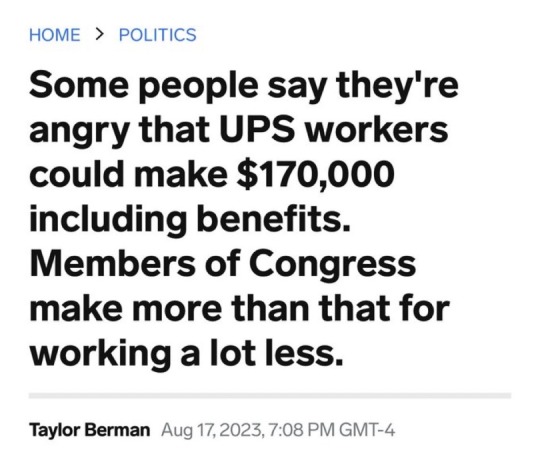
Source
Need more headlines like this
#politics#us politics#government#the left#workers#workers rights#unions#unionize#working class#solidarity
28K notes
·
View notes
Text
#talkin#tik tok#food#waffle house#fema#fema scale#worker exploitation#workers rights#union#unionize#ussw#5k#10k#15k#20k
24K notes
·
View notes
Text

17K notes
·
View notes
Text


December 7, 2023 - Hundreds of UK union workers blockaded companies who sell weapons or parts for fighter jets that Israel uses for its genocidal campaign against the Palestinian people. Four factories were blockaded in Bournemouth, Lancashire, Brighton and Glasgow.
Palestinian unions have asked for union workers across the world to use their power to show solidarity with the Palestinian people. Dock workers have recenty heeded this call for solidarity by blocking Israeli weapons shipments in several countries, inculding South Africa, Greece, Turkey, Belgium, and Italy. [video]
#solidarity#unions#palestine#free palestine#blockade#workers#working class#industrial action#gif#occupation#apartheid#anti-colonialism#2023#dockworkers#uk#factory#working clas#gaza
8K notes
·
View notes